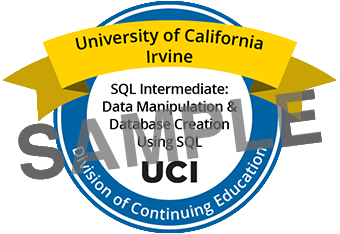Database Management
Today, organizations in every industry (i.e. healthcare, finance, retail, telecommunications & others) are being showered with imposing quantities of new information. Along with traditional sources, many more data channels encompassing unstructured data now exist. This proliferation of data from both structured and unstructured sources is giving rise to a phenomenon called "Big Data." Therefore, it is becoming increasingly important to utilize the right tools and techniques to capture and organize a wide variety of data types from different sources (both structured and un-structured), and to be able to easily analyze it within the context of all your enterprise data.
Who Should Enroll
This program is of interest to anyone who wants to use the powerful capabilities of relational databases in conjunction with the new "Big Data" management frameworks for data storage and retrieval, and for data analysis in support of management decision-making. Data architects, data analysts, database administrators and information technology staff members can all benefit from this program.
Program Benefits
This program is designed to provide students with the expertise to effectively manage and analyze structured and unstructured data. This flexible program allows students to obtain general data analysis and management skills or apply both Oracle and Microsoft SQL Server database management systems. This program also touches on the new emerging frameworks and methods for managing, processing and analyzing “Big Data”.
Earn an Alternative Digital Credential
 Successful completion of a qualifying assignment within select course(s) offers you the opportunity to earn an Alternative Digital Credential (ADC). Also referred to as a digital badge, an ADC is a virtual record of specific skills and competencies you have acquired and provides a verifiable way for you to share your educational achievements with employers, colleagues and others via social platforms like LinkedIn or Facebook.
Successful completion of a qualifying assignment within select course(s) offers you the opportunity to earn an Alternative Digital Credential (ADC). Also referred to as a digital badge, an ADC is a virtual record of specific skills and competencies you have acquired and provides a verifiable way for you to share your educational achievements with employers, colleagues and others via social platforms like LinkedIn or Facebook.
Explore the criteria necessary to earn an ADC in:
- SQL Intermediate: Data Manipulation & Database Creation Using SQL
Applicable course: Intermediate SQL Programming (completed after 11/15/22*)
Learn more about Alternative Digital Credentials and how they can help you demonstrate your commitment to professional development and distinguish yourself in a competitive job market.
*Courses completed prior to indicated dates are not eligible for a badge.
Eligibility and Requirements
Apply to become a candidate for the program: A Declaration of Candidacy is required to establish candidacy in this program. Complete the application and pay the application and candidacy fee of $125 (non-refundable). Learn more about the benefits of becoming a candidate. Candidacy is not required to enroll into individual course in a program.
A candidate in the program is awarded a certificate upon the successful completion of a minimum of fifteen (15) units, each with a letter grade of “C” or better. All requirements must be completed within five (5) years after the student enrolls in their first course. To receive the Certified Digital Certificate after completing all the program requirements, students must submit the Request for Certificate to initiate the certificate audit process. Students not pursuing the certificate are welcome to take as many individual courses as they wish.
Some courses may be listed as electives in multiple certificates, students may use a maximum of two courses to fulfill a certificate requirement between two programs.
Certificate
Approximate Tuition
$5,559Format
OnlineDuration
9-15 monthsTotal Units
15Enroll and pay for courses as you go.
Have Questions?
Talk to an enrollment coach
Call: (949) 824-5414
Monday - Friday, 9am - 4pm (Pacific)

Course Schedule
Course schedules are subject to change. Individual courses may be taken without enrolling in the full program.
Required Courses
Career Advancement Network
DCE is proud to offer our learners, candidates and graduates valuable career resources, including personalized career coaching, mentorship, online technology tools, live webinars, and more.

